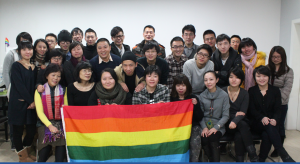GENDER REVOLUTION AND PARENTS: AN INTERVIEW WITH SEAN GROVER

 The gender norms are changing, and Sean Grover, L.C.S.W., is here to guide parents through it. Sean is a psychotherapist, a public speaker and an author. Publishers Weekly gave his parenting book, When Kids Call the Shots, a starred review, calling it “empowering, (and) motivating”. I stumbled upon his article Parent’s Guide to the Gender Revolution on Psychology Today, and found it very interesting as youths like myself from this generation are constantly trying to break free from the gender roles we were raised upon. His article is an aid to teenagers dealing with the pressure of trying to be themselves and what their parents want them to be, and to parents who are trying their best to be supportive and do the right things. Keep on reading to find out more.
The gender norms are changing, and Sean Grover, L.C.S.W., is here to guide parents through it. Sean is a psychotherapist, a public speaker and an author. Publishers Weekly gave his parenting book, When Kids Call the Shots, a starred review, calling it “empowering, (and) motivating”. I stumbled upon his article Parent’s Guide to the Gender Revolution on Psychology Today, and found it very interesting as youths like myself from this generation are constantly trying to break free from the gender roles we were raised upon. His article is an aid to teenagers dealing with the pressure of trying to be themselves and what their parents want them to be, and to parents who are trying their best to be supportive and do the right things. Keep on reading to find out more.
Hello, Sean, thank you so much for taking time out of your day to answer these questions. Your article touching upon LGBTQ+ youth trying to find their identities and needing their parents’ support is very relevant in this day and age. Before I ask you about this issue, I’d like you to tell us more about your vocation and research for readers hearing about you and your line of work for the first time.
I’ve been providing psychotherapy for children, teenagers, and parents for nearly 25 years. I’ve worked in elementary schools, middle schools, high schools etc. The question I always ask myself when I meet a young person who is struggling is, “What’s missing? What does this young person need to succeed?” Rather than trying to “fix” a young people, it’s more effective to give them greater opportunities to develop. Youth have a hunger for role models, mentors, they have passions and talents, but often not enough opportunities.
I understand that you have two daughters who’ve inspired the work on your book. What else would you consider has encouraged you to pursue this field of Psychology?
I was very fortunate as a young man to have mentors and teachers who inspired me. During my most difficult struggles, they were there to encourage me and lift me up. I decided I want to be that kind of person for young people. So in my 20s, I went back to school and got my degree in social work. I love this profession. I love my work. And I look forward to going to my office every day.

In your article you talk about the Gender Revolution with its effect on the youths who are expanding their identities from the binary gender roles their parents have grown accommodated to. Could you elaborate a little on these gender roles and try to explain why some of the parents are trying to make their children adhere to the roles which are seeming to progressively dissolve day by day?
Every generation finds themselves in conflict with the previous generation. Whether it is music, fashion, lifestyle etc. sexual identity is no different. But once you understand it, and what it stands for, it is less threatening. It’s about freedom, and choices. It’s about celebrating individuality. People are often frightened by things they don’t understand. It’s easy to label and demonize people you’ve never met. That’s just fear in action.
How do you propose children with parents of a firm and dismissive mind-set go about dealing with this rejection and lack of acceptance? I can see some parents being concerned with the safety of their children in a homophobic and transphobic world, so how do you think they could find a balance between protecting and liberating their children?
Good parents are always concerned about their children’s future and about their children’s safety. Depending on where you live, gender identity issues can be quite inflammatory. Having a dialogue with your children, sharing your concerns without judgment, criticism, or comparisons, keeping lines of communication open, are the best ways to support and protect your child. Young people make better decisions and think clearer when their parents support them. When their parents are harsh or critical, they are more likely to make poor choices out of defiance.
One of my biggest concerns for my peers on their journey towards establishing their identity and individuality is the fact that the experiences, morals and conventions that a person grows with is unique to them. In your U.S. News interview you talked about how vague and generic strategies for dealing with a problem are unhelpful. What are your thoughts then on the resources and help available for the adolescents in this community in this context?
All of the support services available to transgender youth in my area are free. There are phone numbers to call, there are counselors available, there are support groups, housing. It may be impossible to find a group that is specific to a certain ethnicity or culture, but when people unite against oppression and fight for change together, they transcend many of those differences. The important thing is to keep trying until you find the support you need and be open minded in the process.
Following up on the previous question, intersectionality plays a huge role in the experiences and consequences of a person’s life. A transgender Latina woman’s hardships would be different from that of a gay white male. If the resources to help them can’t be same for full effect, what do you think a support system for this community could be that is accessible and affordable, preferably free of cost?
Every day there are more and more support services. Colleges in particular offer more support than ever before. With the Internet, you can find people and organizations who can support you. But no one is going to come knocking on your door. You have to take initiative and keep looking, in time you will definitely find the group that you feel most comfortable with.
Coming back to the parents of the members of this community, along with the steps explained in your article, is there any other advice you have for them?
Parents should look for support groups in their area. Become familiar with what’s out there. Meet parents who share their struggle and educate themselves about these issues.
Lastly, I would like you to talk about your book When Kids Call the Shots for the readers, and explain how you’ve come up with the solution to the problem of the one-script-fits-all ideology we see around so much.
In my book I encourage parents to keep developing and challenging themselves. The parent is the body, the child is the shadow. Understanding your history, how you were parented, your values etc. these are what make your parenting experience unique. Rather than seeking to control your child, understand yourself and your child better by developing more patience, more mindfulness, listening better. That is the express lane to having a positive relationship with your child and establishing a culture of respect in your family. My website, www.seangrover.com, has free parenting videos and articles. If parents have questions they can always reach me through my site.
You can also find Sean through his Facebook, Twitter, LinkedIn and YouTube. When Kids Call the Shots is also available in Chinese and Russian.



Responses